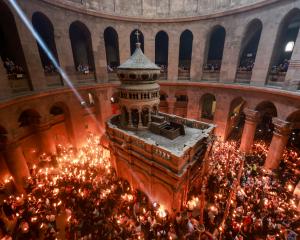These are difficult times for mainstream Christian churches.
Many congregations are dwindling and ageing and the stark divisions between liberals and conservatives continue to manifest themselves, particularly on the issue of same-sex marriages. Parishes in many places cannot afford full-time clergy, and rural and urban churches close regularly.
Census data illustrates the fall in those professing to be Christian. More than 90% did so 100 years ago and that figure is now under 50% and falling. Regular church attendance has declined during that period from about 30% to about 15%. Society and technology changes from the 1960s have had a huge impact. Where once churchgoing in some circles was expected and part of maintaining one's position in the community, it is now clearly a minority pastime. Not everyone is concerned about this trend because churchgoing, rather than being a default position, requires a willingness to be different, even countercultural.
Many young New Zealanders these days have never attended a church service, not even at Christmas or Easter and not for weddings or baptisms. The Catholic Church has been partly supported by immigration, and there are now large numbers of Hindus, Buddhists and Muslims. As well, within mainstream churches are scattered vigorous congregations, often but not exclusively fitting somewhere along the evangelical, fundamentalist or pentecostal spectrums. Then there are a collection of not dissimilar Christian congregations outside mainstream structures. These can be large, often with more younger members.
They can surge rapidly, particularly on the back of inspirational pastors, and they can also be vulnerable to waning quickly. They speak of the need of people to believe and to belong, of the search for meaning and a basis for right and wrong.
Nevertheless, despite its Christian heritage, Christian underpinning and in some senses ‘‘Christian'' culture, New Zealand is going the way of parts of northern European and rapidly becoming more and more secular. In this context, the questioning this week from the retiring Anglican Bishop of Dunedin, the Rt Rev Dr Kelvin Wright, about whether the Dunedin diocese should replace him with a full-time bishop is realistic and sensible. Maintaining the established church hierarchy in the face of falling numbers can become too expensive and a questionable use of precious resources desperately needed in the parishes and in parish and church outreach into the community.
There is nothing like crises to force people and organisations to examine what they do, to look for fresh ways of fulfilling their purpose. There are no easy answers. But in some cases new ways are found and/or traditional strengths carried out more effectively. As University of Otago church historian Tim Cooper said in a ‘‘Faith and Reason'' column in this newspaper in March, all is not doom and gloom. Despite the unmistakable statistical decline, many New Zealanders still go to church on Sunday mornings.
And they do so out of genuine conviction and need, rather than just because it is socially desirable.
He also said that while the church had lost its former place of speaking from the centre of society, the margins might be a safer place for the church to be. ‘‘Perhaps the church ought to be the prophet at the gate, not chaplain to the nation. The social prestige of the church in the West posed spiritual dangers of coerciveness, complacency and conformism to which Christians often succumbed.'' In what direction, though, will the church head in the modern world?
While the broad church shares Jesus as its inspiration and the Bible as its scripture, what that means in practice can be poles apart. That is no better illustrated than in widely differing and seemingly irreconcilable attitudes to same-sex marriage. Without a tolerance of differing views, the mainstream churches could well face further decline and further loss of relevance.













